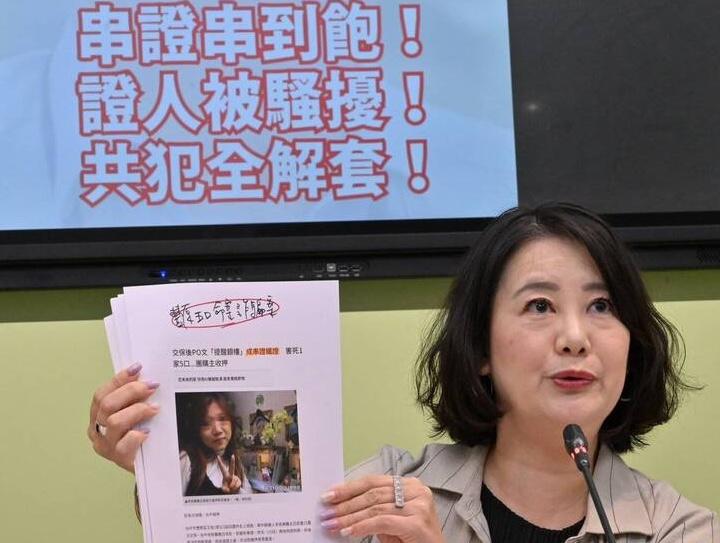An amendment proposed yesterday by the Taiwan People's Party (TPP) caucus to tighten the requirements for a court to order a suspect detained would be a major change to the judicial system made to benefit a single individual, Democratic Progressive Party (DPP) caucus chief executive Rosalia Wu (吳思瑤) said today.
TPP Chairman Huang Kuo-chang (黃國昌) and legislators Chang Chi-kai (張啓楷) and Chen Gau-tzu (陳昭姿) proposed a change to the Code of Criminal Procedure (刑事訴訟法) that would eliminate “risk of colluding with accomplices or witnesses” as a reason to detain someone incommunicado, such as in the ongoing case of former TPP chairman Ko Wen-je (柯文哲).
Ko and another defendant are currently being held incommunicado in connection to an ongoing corruption investigation regarding the Core Pacific City redevelopment case.

Photo: Liu Hsin-de, Taipei Times
The TPP proposal said that the “risk of collusion” is cited too frequently, with only vague justification to detain defendants in contravention of their constitutional right to a presumption of innocence.
Instead, detainment should only be an option when there are no alternative measures and “concrete facts” already establish the risk of destroying evidence or fleeing, the draft proposal says.
The Legislative Yuan is scheduled to debate the proposal on Friday.
At a news conference, Wu accused TPP lawmakers of abusing their legislative powers to amend laws on a case-by-case basis to protect Ko
If the amendment were to pass, all types of criminals would take advantage of it, Wu said.
Fraud rings, organized crime, Chinese spies and child abusers would be able to collude with accomplices, harass witnesses and get away with their crimes, Wu said.
DPP Legislator Chen Pei-yu (陳培瑜) cited a murder case in Taichung, in which prosecutors were initially unable to detain their primary suspect.
After the suspect was released on bail, she allegedly forced several witnesses to change their statements, although she was later detained when further evidence was uncovered, Chen said.
Huang’s amendment would allow such suspects to remain free, Chen added.
In a statement today, the TPP said that its proposal was not for the benefit of Ko specifically, but rather for all who could find themselves in a similar situation, as the presumption of innocence is an internationally recognized principle of criminal procedure.
A 2009 constitutional judgement stated that detention should “only be used after ensuring that there are no other alternatives,” as it “severely infringes on the personal liberty of criminal defendants, and seriously impacts their reputation and credibility,” the TPP said.
Legal experts have urged reform, as prosecutors’ “fear of collusion” has turned the law into a tool for incrimination, it said, adding that judges often arbitrarily order detention by copying and pasting documents, changing only the defendant’s name.
Yesterday evening, lawyer Lin Chih-chun (林智群) said the amendment would “open a path” for criminals.
In the Kai Kai (剴剴) child abuse case for example, the amendment would have allowed for his abusive nannies to remain free and collude on their testimonies, as long as they did not flee, Lin said.
If it were to pass, the legal system would not be able to detain accomplices or missing witnesses, even if they might be colluding with the key suspect, Lin added.
Additional reporting by Lin Che-yuan and Kayleigh Madjar

The Coast Guard Administration (CGA) yesterday said it had deployed patrol vessels to expel a China Coast Guard ship and a Chinese fishing boat near Pratas Island (Dongsha Island, 東沙群島) in the South China Sea. The China Coast Guard vessel was 28 nautical miles (52km) northeast of Pratas at 6:15am on Thursday, approaching the island’s restricted waters, which extend 24 nautical miles from its shoreline, the CGA’s Dongsha-Nansha Branch said in a statement. The Tainan, a 2,000-tonne cutter, was deployed by the CGA to shadow the Chinese ship, which left the area at 2:39pm on Friday, the statement said. At 6:31pm on Friday,

The Chinese People’s Liberation Army Navy’s (PLAN) third aircraft carrier, the Fujian, would pose a steep challenge to Taiwan’s ability to defend itself against a full-scale invasion, a defense expert said yesterday. Institute of National Defense and Security Research analyst Chieh Chung (揭仲) made the comment hours after the PLAN confirmed the carrier recently passed through the Taiwan Strait to conduct “scientific research tests and training missions” in the South China Sea. China has two carriers in operation — the Liaoning and the Shandong — with the Fujian undergoing sea trials. Although the PLAN needs time to train the Fujian’s air wing and

The American Institute in Taiwan (AIT) put Taiwan in danger, Ma Ying-jeou Foundation director Hsiao Hsu-tsen (蕭旭岑) said yesterday, hours after the de facto US embassy said that Beijing had misinterpreted World War II-era documents to isolate Taiwan. The AIT’s comments harmed the Republic of China’s (ROC) national interests and contradicted a part of the “six assurances” stipulating that the US would not change its official position on Taiwan’s sovereignty, Hsiao said. The “six assurances,” which were given by then-US president Ronald Reagan to Taiwan in 1982, say that Washington would not set a date for ending arm sales to Taiwan, consult

A Taiwanese academic yesterday said that Chinese Ambassador to Denmark Wang Xuefeng (王雪峰) disrespected Denmark and Japan when he earlier this year allegedly asked Japan’s embassy to make Taiwan’s representatives leave an event in Copenhagen. The Danish-language Berlingske on Sunday reported the incident in an article with the headline “The emperor’s birthday ended in drama in Copenhagen: More conflict may be on the way between Denmark and China.” It said that on Feb. 26, the Japanese embassy in Denmark held an event for Japanese Emperor Naruhito’s birthday, with about 200 guests in attendance, including representatives from Taiwan. After addressing the Japanese hosts, Wang